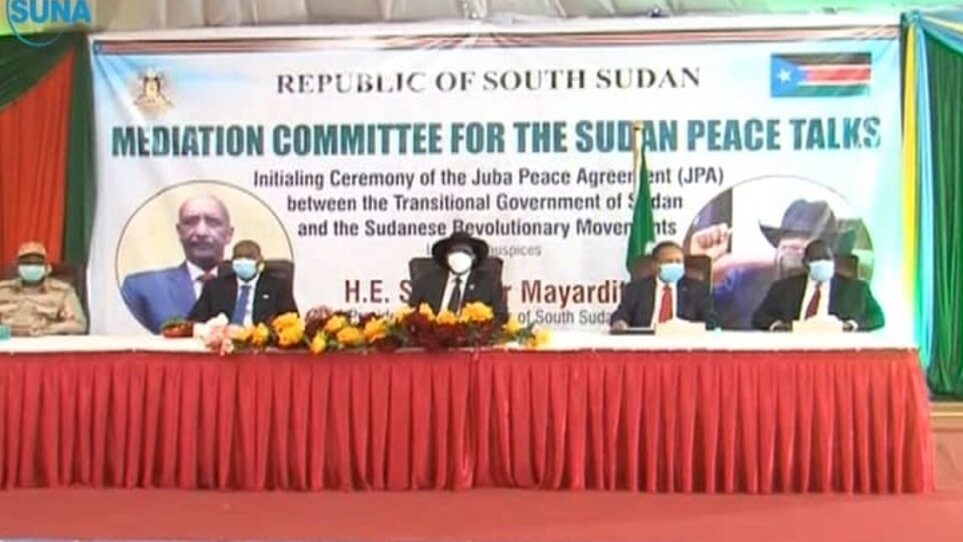Sudan’s transitional government and a majority of the armed rebel forces represented by the Sudanese Revolutionary Front (SRF) have finally reached a peace agreement. The official signing ceremony was held in South Sudan’s capital city, Juba, on Monday, August 31.
On Friday evening, ahead of the final signing ceremony, seven protocols were initialed by the negotiating parties. According to Radio Dabanga, these concerned “wealth sharing, power sharing, displaced people and refugees, land ownership and hawakeer (lands traditionally used by a tribal community), compensation and rehabilitation, accountability and reconciliation, and the pastoral sector.”
The SRF is an umbrella of different rebel groups active in the western region of Darfur and southern states of Blue Nile and South Kordofan, known as the Two Areas.
SRF was formed as a coalition in 2011. It consists of the Sudan People’s Liberation Movement-North (SPLM-N) which is active in the Two Areas, and the forces in Darfur including Justice and Equality Movement (JEM), Sudan Liberation Movement’s faction led by Abdelwahid El Nur (SLM-AW) and another faction headed by Minni Minawi (SLM-MM).
Among them, the SLM-AW is not a part of the agreement and has refused to take part in the negotiation until a civilian government is established and peace and stability is restored in the Darfur region. The faction of SPLM-N led by Abdelaziz al-Hilu, which withdrew from negotiations on August 20 after attacks by a pro-government militia in South Kordofan, is also not party to the agreement.
Al-Hilu faction’s withdrawal from the negotiations leaves the SPLM-N led by Mallik Agar as the main party to this agreement in the Two Areas. Combatants of this group will be integrated into the army in a period of 39 months.
According to Sudan Tribune, which has accessed a copy of the agreement, the Agar led SPLM-N “will nominate the governor of Blue and deputy governors of South Kordofan and West Kordofan states. In addition, it will get 30% of the executive and legislative bodies the Two Areas will have self-governance and will have the right to legislate.”
Christians form a considerable section of the population in this region. The agreement provides for the establishment of a National Commission for Religious Freedom.
The agreement also stipulates that for a period of 10 years, 40% of the wealth produced in these states will be reserved for the Two Areas, where the current civil war has been ongoing since 2011.
In Darfur, SLM – Minnawi and the JEM, along with some smaller groups, are the main parties to the agreement. It makes way for rehabilitation of the Internally Displaced Persons (IDPs). The civil war ongoing since 2003 is estimated to have taken 300,000 lives and displaced 2.5 million,
Majority of the population in the conflict affected regions of Darfur and the Two Areas belong to non-Arab ethnic minorities. They took to armed rebellion against the perceived social, economic and political discrimination they faced during the Islamist regime of the former dictator Omar al-Bashir.
Bashir was ousted from power by the mass civilian protests which broke out in December 2018, and made way for the formation of transitional government in August 2019. One of the most important tasks this government was entrusted with by the protest movement was to negotiate a peace agreement with the rebel forces to bring an end to the civil wars.
Al-Hilu’s faction, which withdrew from the talks, insists a genuine peace agreement should address the root cause of the problem. This, according it it, is the religious-sectarian nature the Sudanese state acquired under Bashir’s rule.
“Under sharia Islamic law you cannot achieve equality between the diverse populations of Sudan,” al-Hilu reiterated on August 25, deeming the post-Bashir transitional government’s insistence on deferring the discussion over secularism to the constitutional conference as an attempt to “avoid discussing the root causes of the problem.”
If the government is unwilling to commit to secularism at this point in the negotiation, the group insists on placing the right to self-determination of people in the Nuba mountains in South Kordofan as an agenda on the negotiating table.
This deadlock has impeded progress with the al-Hilu faction since the beginning of the negotiations in October last year. On August 20, this group withdrew from the peace negotiations after the Rapid Support Forces (RSF) carried out attacks in South Kordofan.
RSF, a militia which was cultivated by the army under Bashir to suppress these rebellions, is alleged to have participated in the genocides of his regime. Post-Bashir, the RSF has been incorporated as a part of the Sudanese Armed Forces (RSF).
But it remains an autonomous force within, led directly by General Mohamed Hamdan, known also as Hemeti. He is currently the country’s Vice-President, and is leading the delegation negotiating from the government’s side.
SPLM-N al-Hilu has complained that he “lacks neutrality and is not qualified to lead the negotiation delegation.”





